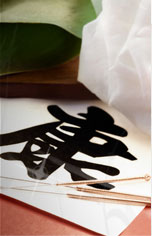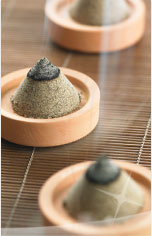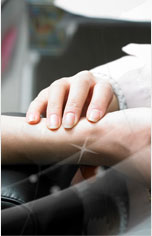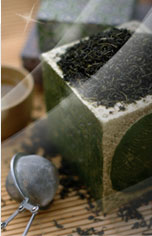| |
Acupuncture and Chinese Herbs for Infertility |

Infertility is defined as the inability to conceive after 12 months of active trying. Females who are able to get pregnant but cannot carry a pregnancy to term may also be considered infertile.
According to the Centers for Disease Control (CDC) about 12% of women aged 15 to 44 years in the United States have difficulty getting pregnant or sustaining a pregnancy.1 Approximately one-third of cases are from male factors, one-third of cases are from female factors, and the remaining cases are from issues with both male and female, or unexplained. In conventional medicine, infertility is usually treated with medicine, surgery, and assisted reproductive technologies (ART), such as in vitro fertilization (IVF) and intrauterine insemination (IUI).
Infertility in TCM
Traditional Chinese medicine (TCM) has a long history of enhancing fertility for both men and women. Fertility treatments were first recorded by enhancing fertility for both men and women. Fertility treatments were first recorded by Zhang Zhong Jing, a famous physician from the Han Dynasty (206 B.C. - 220 A.D.), in his discussion of diseases in women in the Jin Gui Yao Lue (Essentials of the Golden Cabinet).
In TCM, human fertility relies on the normal functioning of Zang Fu organs and the balance in Yin & Yang, Qi and Blood of the body. In Chinese medicine, the Kidney, the Liver, and the Spleen play an important role in human fertility. Emotional stress, such as anger, frustration and anxiety, can easily interfere with the flow of Blood and Qi. Improper diet, excessive or insufficient physical activities, overwork, excessive sexual activity as well as hereditary and environmental factors can develop imbalances of fundamental elements and dysfunctions of Zang Fu organs, leading to infertility.
Key Roles of Organs in Fertility
Kidneys: In TCM, the Kidneys store Essence (Jing) and govern the growth, development and reproduction. Essence in the Kidneys makes men able to produce sperm and women able to ovulate. If an imbalance exists within the Kidneys, the reproductive ability will be affected, possibly leading to infertility.
Liver: In TCM, the Liver governs the smooth flow of Qi (the vital energy of the body). The Liver also maintains and stores the Blood. It regulates the amount of blood provided for the various parts of the body, and therefore, has a significant influence over the menstrual cycles in women. If the Liver is out of balance, the body will not receive the required supply of Qi and Blood, causing increased possibility of infertility.
Spleen: An adequate supply of Qi and Blood is required by a woman’s body to sustain a normal menstrual cycle, a growing fetus, and a healthy pregnancy. The Spleen is responsible for producing Qi and Blood to nourish the body. Disharmony within the Spleen can cause poor Blood supply to the reproductive system, causing infertility.
TCM Pattern Differentiation
TCM diagnoses the root cause of infertility by identifying a complex pattern of disharmony in the body. Pattern differentiation involves identifying the nature and location of underlying imbalances of the body, functional changes occurring from the disharmony, and the degree of the body’s resistance. TCM treatment for individual patient depends on the pattern differentiation diagnosis. Patients diagnosed with same disease in Western medicine may have different patterns in TCM. Also, patients with same pattern differentiation in TCM may present with different signs and symptoms.
The following are the most common patterns for infertility. Patients are often diagnosed with more than one pattern.
| TCM Patterns |
Male Feritility Factors |
Female Fertility Factors |
Deficiency of Kidney Yin
Deficiency of Kidney Yang
Deficiency of Qi and Blood |
Sexual issues
Lack of ejaculation
Autoimmunity
Testosterone vacuity
Low semen count
Low sperm quality
Abnormal motility |
Lack of Ovulation
Small uterus
Thin endometrium
Poor quality of eggs
Low estradiol level
Low progesterone level
High FSH or LH |
Qi Stagnation
Blood Stasis
Phlegm-Damp Obstruction |
Abnormal morphology
Varicocele
Blockage of ejaculatory ducts
Unexplained infertility |
Fallopian tube obstruction
Uterine fibroids
Ovarian cystitis
Endometriosis
Adhesions
Unexplained infertility |
| Damp-Heat | Infection | Infection |
NOTE: The names of organs are capitalized when referring to the entire, functional organ systems in TCM perspective: Liver, Blood, etc. The names of organs are lower-cased when referring to the distinct, biomedical organs: liver, blood, etc.
TCM Treatment for Infertility
TCM has been used to treat both male and female fertility problems for over 2500 years in China and other Asian countries. In the recent decades, infertility treatment with TCM is getting popular in Europe and the USA. TCM provides natural, least invasive, effective, safe, and cost-effective treatment to enhance both male and female fertility. TCM not only helps couples who desire to conceive naturally but also improves the success rate of IVF and IUI.
A clinical study concludes that acupuncture and Chinese herbal medicine have potent effects in reversing infertility. Several types of patients suffering from infertility participated in the study, including those using IVF, IUI and those using no biomedical assistance. All types showed significantly improved pregnancy rates. 52.38% of women in the study conceived with acupuncture and/or herbal medicine without biomedical assistance. The combination of IVF with acupuncture has a significantly higher success rate of 42.5%, compared the success rate of 24% for IVF as a standalone therapy. Another 9.52% conceived with acupuncture and/or herbs combined with IVF and 4.76% conceived with IUI combined with acupuncture. No adverse events were reported as a result of acupuncture and herbal medicine treatments. 2
TCM treatment plan depends on the pattern differentiation diagnosis. Every treatment plan will be customized to address the individualized patient’s needs. Acupuncture, Chinese herbs, abdominal massage, dietary regulation, and lifestyle modification are all useful in the treatment of fertility.
Typical course of treatment will span 3-12 months. Although there are cases of achieving natural pregnancy after 4-6 weeks of treatments, a minimum time frame of 3 months are generally required because the eggs begin their maturation 90 days before they are chosen for ovulation, and the sperm maturation process takes 70-90 days. If you are preparing for IUI or IVF procedures, we will adjust the treatment plan according to the schedule of procedures.
|
Acupuncture
Acupuncture improves natural conception rates and the success rates of IVF and IUI. The effects of acupuncture for infertility include:
- Reduces stress levels
Elevated stress can prohibit conception by blocking blood flow to the reproductive organs and causing an imbalance in hormonal production, thus resulting in irregular menstrual cycles, lack of ovulation, poor ovarian production, diminished egg quality, and poor sperm production and quality.
- Increases blood flow to the pelvic cavity and strengthens the function of reproductive organs
- In female, it enhances egg quality, thickness of the endometrium (uterine lining), and implantation rates and reduces the chance of miscarriage.
- In male, it helps improve the quantity and quality of sperm.
- Balances the hypothalamus-pituitary-gonadal axis to regulate and improve the body’s natural hormonal production
- Stimulates ovulation
- Decrease the side effects of fertility medications used with IUI and/or IVF
- Strengthen the immune system to prevent immunological complications and decrease inflammation
Electro-Acupuncture
Electro acupuncture is a form of acupuncture; as with traditional acupuncture, needles are inserted on specific points along the body, then attached to a device that generates continuous electric pulses using small clips. These devices are used to adjust the frequency and intensity of the impulse being delivered, depending on the condition being treated. Electro stimulation enhances the effect of the acupuncture needles and is especially helpful for patients with Blood Stasis.
Moxibustion
As an additional therapy to the acupuncture treatment, moxibustion can be applied. Moxibustion is a procedure of burning of a Chinese herb called mugwort (moxa, Artemisia Argyi Folium) over the acupuncture point. It is used to treat certain types of pelvic pain and infertility. Deep warmth is usually felt after moxibustion in the applied area. Moxibustion increases the blood flow to the pelvic cavity, alleviate menstrual cramps, and promotes follicular development.
|
|
Benefits of TCM in Preconception Care
- Increases chance of conceiving naturally
- Improves reproductive health and strengthens immune system
- Increases libido
- Overcomes common fertility challenges, including:
- Advanced maternal age
- Cervical mucus issues
- Endocrine imbalances
- Endometriosis
- Elevated FSH
- Erectile dysfunction
- Fallopian tube blockage
- Luteal Phase Defect
- Low sperm motility, morphology, and overall quality
- Menstrual irregularities
- Ovarian cysts and PCOS
- Ovulation factors
- Pelvic Inflammatory Disease
- Premature ovarian failure / poor ovarian reserve
- Recurrent miscarriages
- Thin uterine lining
- Thyroid problems
- Unexplained Infertility
- Increases the success rate of IVF and IUI
- Reduces side effects of fertility medications, including night sweats, mood swings, and headaches
|
Chinese Herbal Medicine
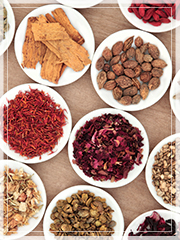
Chinese herbal medicine promotes blood flow to the reproductive organs to improve sperm parameters in male and to improve egg quality and thickness of uterine lining in female. By thickening and strengthening uterine lining, Chinese herbs help increase implantation rates and prevent miscarriage. Chinese herbs can also manage many of the underlying causes of infertility, including endometriosis, polycystic ovarian syndrome (PCOS), fibroids, erectile dysfunction, and immune system imbalance by nourishing Qi and Blood and restoring the balance of Zang Fu organs. There is no evidence of negative interaction between Chinese herbs and fertility medications.
Chinese herbs are usually used in a combination of 2 to 30 herbs and are customarily prescribed for each patient. Herbs can be administered to a patient in many forms. Raw herbs can be taken on a brewed tea form. This herb tea form is strong and quick acting; however, it takes time for cooking and preparation and the taste can be quite strong initially. The herbs can also be prescribed in many other forms such as powder, capsule, pill, topical and tincture. Herbs possess many strengthening as well as therapeutic effects because of their content of various nutrients and vitamins, which are essential to the body.
Tips for Increasing Chances of Getting Pregnant
Right Timing
A woman can only get pregnant during the ‘fertile window’ in the menstrual cycle. The ‘fertile window’ is the day of ovulation and the five days beforehand. This is because eggs can only be fertilized for around 24 hours after ovulation, and sperm can survive in the female reproductive tract for up to four or five days. Eggs and sperm need to meet at the right time to get fertilized and create an embryo.
Pregnancy is technically only possible if you have sex during the five days before ovulation or on the day of ovulation. But the most fertile days are the three days leading up to and including ovulation. Having sex during this time gives you the best chance of getting pregnant. Knowing when you ovulate can help you plan for sex at the right time and improve your chance of getting pregnant. There are several techniques that you can use to more precisely pinpoint your ovulation and fertile window.
Tracking the menstrual cycles
You can keep track of your menstrual cycles on a chart, in a diary, or on a free period-tracker app on your smartphone. To work out the length of your menstrual cycle, mark the first day you start bleeding (first day of your period). as day 1. The last day of your cycle is the day before your next period begins. The length of the menstrual cycle can vary between women and from one cycle to the next. If your menstrual cycles are different lengths, you can get the average cycle length by adding the length of three menstrual cycles and divide the total number by three.
Ovulation happens about 14 days before your period starts. The fertile window opens five days before the ovulation, but you are most fertile two days before and the day of ovulation. For example:
- If your average menstrual cycle is 28 days, ovulation happens around day 14, and the most fertile days are days 12-14.
- If your average menstrual cycle is 35 days, ovulation happens around day 21, and the most fertile days are days 19-21.
- If you have shorter cycles, say 21 days, ovulation happens around day 7, and the most fertile days are days 5-7.
Ovulation predictor kit
Ovulation predictor kits are similar to a urine pregnancy test kits. They test your urine to detect luteinizing hormone (LH), which surges right before ovulation. You will urinate on the test strips every morning, starting a few days before the day you next expect to ovulate. A positive result means you are going to ovulate within the next 24 to 36 hours.
Healthy Diet
For both men and women, a healthy diet can improve the chances of getting pregnant and the overall health of the parents and the baby. Being a healthy weight help improve the quality of sperm and eggs, prevent erection problems, and balance both male and female hormones.
- Beverages: Liquids in our diet play an equally important role in maintaining our health as foods do. Sugared drinks, including soft drinks, flavored waters and fruit juices, raise the blood sugar levels and promote inflammation. Stick with water and unsweetened teas to quench your thirst throughout the day. Organic whole milk or almond milk is also an excellent choice for the protein and healthy fats we need.
- Carbohydrates: Carbs themselves are not bad for the body, but refined white carbs should be avoided. Choose breads and pastas that are made from whole grains or brown rice. Fruits and vegetables contain fibers. Low glycemic index diet is recommended to regulate insulin and other hormone levels. Women with PCOS will need to make even stricter changes to their carb intake to help manage their symptoms.
- Proteins: Protein makes up a very important part of our diet. To avoid meat that has been treated with hormones and antibiotics, buy your meat from a health food store or better yet, from a local farmer. Make it a goal to incorporate protein with every meal in the form of eggs, cheese, yogurt, beans, whole grains such as quinoa, nuts, fish and lean meats.
- Essential Fatty Acids: Essential fatty acids act as hormone regulators. Omega-3 DHA and Omega-6 arachidonic acid are important structural elements of the cell membranes, body tissue, and brain development in the fetus. They also prevent hardening of the arteries and blood coagulation. Salmon, herring, mackerel, anchovies, sardines, flaxseed oil, chia, kiwi, black raspberry, hemp seeds, pumpkin seeds, safflower seeds, walnuts, pecans, hazelnuts, and olive oil are good sources of omega-3 and omega-6 fatty acids.
- Vitamins and minerals: vitamins and minerals, such as iron, magnesium, and zinc, play an important role in maintaining the health of the body, including the reproductive system. They are also essential for the development of fetus. A healthy diet is the best way to get the essential nutrients, or you can take prenatal vitamin daily.
- Limit caffeine: Coffee and various types of tea have a high caffeine content, and energy drinks, some soft drinks, and chocolate also contain caffeine. Caffeine is okay in moderation, but limit to less than 200mg (equivalent to a 12-ounce cup of coffee) per day.
- Avoid alcohol: Unhealthy alcohol habits (binge and heavy drinking) are associated with many fertility problems, including menstrual disorders, miscarriage and reduced sperm quality and quantity. If you are trying to conceive, you should limit or avoid alcohol consumption.
Healthy Lifestyle
- Stop smoking: Smoking can dramatically affect both female and male fertility. Smoking has been associated with infertility and early menopause in women, and sperm problems in men. It also reduces the success of fertility treatment
- Get regular exercise: Regular, moderate exercise help improve your fitness and keep you at a good weight. Exercise also improves the mental health by boosting the endorphin levels and decrease stress. Choose the exercise that you can enjoy doing regularly and try to make a habit of exercising for at least 30 minutes per day, 5 days a week.
- Manage your stress level: Studies discovered that there is more anxiety and depression in infertile women than in those who are fertile.3Both emotional and physical stress can have a profound effect on fertility and pregnancy outcome. Meditation, breathing exercise, reproductive Qi Gong and fertility yoga may help reduce your tension and anxiety. Participating in a support group and sharing your experience during your fertility treatments may also provide valuable peace of mind and a greater sense of control. A supportive group of like-minded people will help reduce the stress level, which is important for creating a healthy environment for conception.
|
|
|

